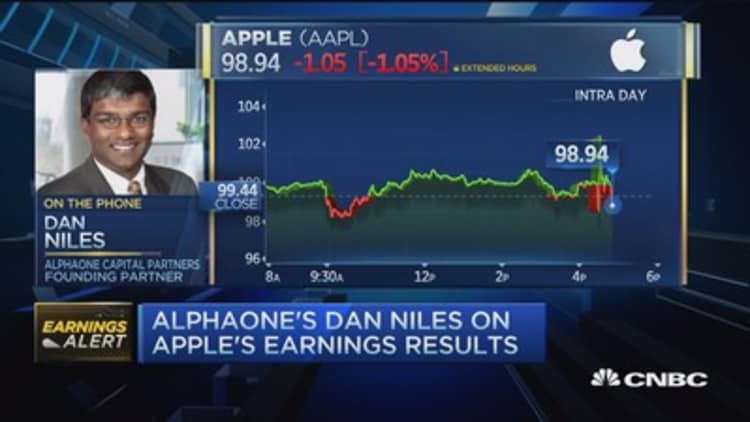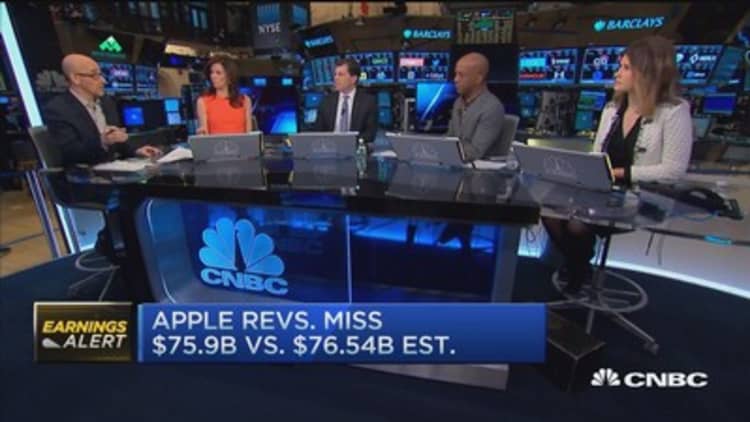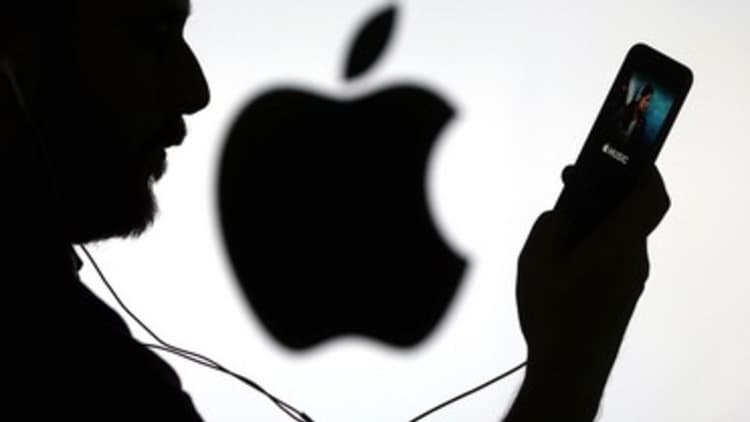


Apple reported fiscal first quarter earnings that beat analyst estimates, but came in below expectations on revenue, iPhone sales and more.
The company said it saw quarterly earnings of $3.28 per share on $75.9 billion in revenue. Analysts had expected Apple to report earnings of about $3.23 a share on $76.54 billion in revenue, according to a consensus estimate from Thomson Reuters.
Apple CEO Tim Cook described the quarter to CNBC as a period in which there were "a lot of great things happening in a turbulent environment."
Apple shares did not immediately move much on the news, but then shifted to a more than 1 percent slide in after-hours trading.
The company also reported that it sold 74.8 million iPhones in the quarter, missing expectations of about 75.46 million, according to StreetAccount.
Apple's most recent iPhone model, the 6S, has been viewed by many analysts as boasting too incremental an improvement over prior iterations to warrant an upgrade — even for those who regularly trade in for the newest model. In fact, Cook said on the company's earnings call that he expects iPhone unit sales to decline in the fiscal-year second quarter.
Cook told CNBC that while the second quarter will be the iPhone's toughest comparison, "the year will get better as we move forward."
Mac and iPad sales also came in weaker than expected. The tablets saw 16.1 million units in the quarter, compared to an expected 17.93 million, and Macs recorded 5.3 million compared to estimates of 5.8 million.
Still, Apple highlighted its earnings success in its quarterly report. The revenue of $75.9 billion compares to $74.6 billion in the year-ago period. Cook said the company would have seen a growth rate of 8 percent in constant currency — instead of 2 percent.
"Our record sales and strong margins drove all-time records for net income and EPS in spite of a very difficult macroeconomic environment," Luca Maestri, Apple's CFO, said in the company's earnings release.
In the earnings call, Cook cited "extreme conditions unlike anything we've experienced before just about anywhere we look," pointed to commodities prices and weakening currencies. As about two thirds of the company's revenue is generated outside of the U.S., foreign currency fluctuations have a "very meaningful impact on our results."
But looking at the international marketplace with a long-term view, Cook said Apple was not seeking to retrench — even in places like Russia that have been hit hard by the collapse in the price of oil. In fact, "this is exactly the period that you want to invest" around the globe, Cook said, later pointing to the company's efforts in India and China.
The company "remains incredibly strong" despite the many challenges across the world, Cook said, revealing that the company saw a record number of switchers from Android to iPhone in the quarter. He also said the tech giant saw the best quarter "by far" for its Apple TV platform, and that it had logged a new quarterly record for Apple Watch sales, and that consumers have spent "billions" with Apple Pay.
The tough global environment may have led Apple to guide below expectations: The company said that it expected second quarter revenue between $50 billion and $53 billion, while the average analyst estimate had been for $55.61 billion, according to StreetAccount.
"I would take the Q2 guidance very seriously," said Estimize's Christine Short. "Usually later in the product cycle, Apple gives pretty spot on guidance. I'd look at this guidance, it was lower than what analysts were expecting and I'd take it quite seriously."
The tech giant has endured a slew of negative press in recent months as suppliers reported fewer orders, casting doubt on the fortunes of Apple's profit-driving iPhone. A report from Credit Suisse in November said that Apple had cut as much as 10 percent of its component orders, and that the move seemed to be "driven by weak demand for the new iPhone 6S."
Shares in the company have fallen nearly 20 percent in the last six months — that's worse than the Nasdaq Composite's 10 percent fall and the Dow's 8 percent decrease.
Analysts are also worried that a slowdown in China could hurt Apple's expected growth in the region. Beijing reported earlier this month that its 2015 economic growth came in at 6.9 percent — a 25-year low. Most outside experts have expressed doubt about the veracity of the government economic data, instead suggesting that the real growth rate was more likely between 3 and 4.5 percent.
On the subject of China, Cook told CNBC Tuesday that the company is "long term and very optimistic" about its business.
Given concerns about the global environment and iPhone sales, estimates for Apple's last three months of the year have been steadily coming down. Some 30 days ago, Wall Street's average earnings expectation was $3.25 per share — that dropped 2 cents by the time the company was ready to report. In fact, nine of the last 10 revisions to analyst estimates saw lowered expectations, according to data from Thomson Reuters.
—CNBC's Josh Lipton contributed.
CORRECTION: An earlier version of this article misstated how Apple's revenue compared to analyst expectations.




